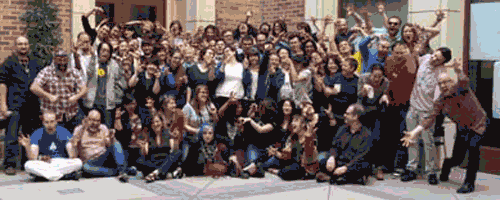Brett Gaylor: From Mozilla to new making |
Yesterday was my last day as an employee of the Mozilla Foundation. I’m leaving my position as VP, Webmaker to create an interactive web series about privacy and the economy of the web.
I’ve had the privilege of being a “crazy Mofo” for nearly five years. Starting in early 2010, I worked with David Humphrey and researchers at the Center for Development of Open Technology to create Popcorn.js. Having just completed “Rip!”, I was really interested in mashups - and Popcorn was a mashup of open web technology questions (how can we make video as elemental an element of the web as images or links?) and formal questions about documentary (what would a “web native” documentary look like? what can video do on the web that it can’t do on TV?). That mashup is one of the most exciting creative projects I’ve ever been involved with, and lead to a wonderful amount of unexpected innovation and opportunity. An award winning 3D documentary by a pioneer of web documentaries, the technological basis of a cohort of innovative(and fun) startups, and a kick ass video creation tool that was part of the DNA of Webmaker.org - which this year reached 200,000 users and facilitated the learning experience of over 127,200 learners face to face at our annual Maker Party.
Thinking about video and the web, and making things that aim to get the best of both mediums, is what brought me to Mozilla - and it’s what’s taking me to my next adventure.
I’m joining my friends at Upian in Paris (remotely, natch) to direct a multi-part web series around privacy, surveillance and the economy of the web. The project is called Do Not Track and it’s supported by the National Film Board of Canada, Arte, and Bayerischer Rundfunk (BR), the Tribeca Film Institute and the Centre National du Cin'ema. I’m thrilled by the creative challenge and humbled by the company I’ll be keeping - I’ve wanted to work with Upian since their seminal web documentary “Gaza/Sderot” and have been thrilled to watch from the sidelines as they’ve made Prison Valley, Alma, the MIT’s Moments of Innovation project, and the impressive amount of work they do for clients in France and around the world. These are some crazy mofos, and they know how to ship.
Fake it Till You Make it
Nobody knows what they’re doing. I can’t stress this enough.
— God (@TheTweetOfGod) September 20, 2014Mozilla gave me a wonderful gift: to innovate on the web, to dream big, without asking permission to do so. To in fact internalize innovation as a personal responsibility. To hammer into me every day the belief that for the web to remain a public resource, the creativity of everyone needs to be brought to the effort. That those of us in positions of privilege have a responsibility to wake up every day trying to improve the network. It’s a calling that tends to attract really bright people, and it can illicit strong feelings of impostor syndrome for a clueless filmmaker. The gift Mozilla gave me is to witness first hand that even the most brilliant people, or especially the most brilliant people, are making it up every single day. That’s why the web remains as much an inspiration to me today as when I first touched it as a teenager. Even though smart people criticize sillicon valley’s hypercapitalism, or while governments are breeding cynicsm and misrust by using the network for surveillance, I still believe the web remains the best place to invent your future.
I’m very excited, and naturally a bit scared, to be making something new again. Prepare yourself - I’m going to make shit up. I’ll need your help.
Working With

source
“Where some people choose software projects in order to solve problems, I have taken to choosing projects that allow me to work with various people. I have given up the comfort of being an expert , and replaced it with a desire to be alongside my friends, or those with whom I would like to be friends, no matter where I find them. My history among this crowd begins with friendships, many of which continue to this day.
This way of working, where collegiality subsumes technology or tools, is central to my personal and professional work. Even looking back over the past two years, most of the work I’ve done is influenced by a deep desire to work with rather than on. ” - On Working With Instead of On

David Humphrey, who wrote that, is who I want to be when I grow up. I will miss daily interactions with him, and many others who know who they are, very much. "In the context of working with, technology once again becomes the craft I both teach and am taught, it is what we share with one another, the occasion for our time together, the introduction, but not the reason, for our friendship.”
Thank you, Mozilla, for a wonderful introduction. Till the next thing we make!
| Комментировать | « Пред. запись — К дневнику — След. запись » | Страницы: [1] [Новые] |






